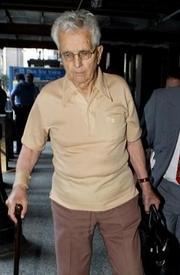POLICE STATE IN CRIMEA

An exotic peninsula with scenic views and a rich history, a crossroad of nations and civilizations, romanticised by Alexander Pushkin (www.PushkinInEnglish.com) in his famous poem The Fountain of Bakhchisaray and by Adam Mickewicz (www.euronet.nl/users/sota/poems.html) in his Crimean Sonnets, the Crimea has been dragging out a miserable existence under a harsh and hostile regime since 1991. We are posting an article on our web site by a Crimean journalist whom we cannot identify for obvious reasons. His account of the present situation in the Crimea conjures up an Orwellian anti-utopia which is a reality now, in the beginning of the XXI century.
Today’s regime in the Crimea is even worse than Communist rule before the collapse of the Soviet Union. Ukrainian nationalists know quite well that they have no legal rights to the Crimea. In a bid to stifle any struggle for freedom and human rights they keep all dissenters under close watch. Political surveillance is being conducted by special spying units run by several government departments: National Security Council, Office of the presidential lieutenant for the Crimea and some branches in the local administration. Very often they put a tail on suspects on a request of local bureaucrats willing to bow and scrape and to curry favour with their superiors in Kiev.
Deadborn Crimean cells of various nationalistic organisations and other groups loyal to Kiev, collect information for Ukrainian and Western intelligence agencies. Youth wings of those organisations in Sevastopol are involved in gathering of a wide range of data on different subjects: from mortality and birth rates to employment patterns. They conduct unofficial opinion polls to ferret out information on citizenship of Crimeans, their family links, revenues, expenses and political views.
Under Ukrainian law this is classified information. Nevertheless, it is reported to be handed over to Euro-Atlantic structures that actually finance the existence of many of the above mentioned groups through different grants for “democratic development and reforms”. The present Ukrainian legislation on the civil service requires from all government employees to take a special oath of allegiance to the Ukrainian state. Employees also swear to keep secret all, even unclassified, information on their activities. They must also commit themselves to abstain from any contacts with media without a special permission. The text of the oath is confidential since it contradicts both the Ukrainian law on media and the state Constitution proclaiming freedom of expression and consciousness. The oath is compulsory even for clerks who never come close to any state secrets. Employees of local departments of culture, sanitary inspection services, health etc. must sign a commitment promising to keep secret all information about their work and to report on politically suspicious colleagues. Hardly ever since Stalin or the Nazi occupation had the Crimea experienced such an Orwellian totalitarianism. To a great extent it is sustained by local turncoats who are more zealous and meaner than outsiders.
An unbearable atmosphere in the Crimea dates back to 1995. It was then that Parliament of the Ukraine adopted Decree 215, signed by former prime minister Evgen Marchuk. This document recommends the following measures on ukrainization of the Crimea and Sevastopol: gradual replacement of all leaders by ethnic Ukrainians with “clean” biography, easing out of the Russian language from the civil service, radical rotation of personnel in education, resettlement of ethnic Ukrainians from Western regions of the country to the Crimea to employ them in militia, security services and military headquarters.
Marchuk who signed Decree 215 was the main grave digger for the Republic of the Crimea, vintage 1991 – 1994. As chief of the Ukrainian Intelligence and then prime minister he presided over numerous special operations against the Republican Movement of the Crimea, the Russian Community and the Republican party. He orchestrated a campaign to discredit vice-premier Evgueny Saburov and to overthrow the first president of the Crimean Republic Yuri Meshkov. A suspicion has it that when security forces besieged Meshkov at the building of the Supreme Soviet he was served food mixed with thallium, a cell destroying chemical that builds up in bones and causes a horrible disintegration of human organism. In 1999 Marchuk unsuccessfully ran for presidency. He lost the first round and supported Leonid Kuchma in the run-off. From a sharp critic of the Ukrainian President Mr. Marchuk turned into one of his ardent supporters and got a post of secretary for the Security Council. Now Marchuk is in disgrace. However the police regime he had helped shaping in the Crimea is still a reality. The only way to overthrow it is to hold a referendum on secession from the Ukraine. Am overwhelming majority of Crimeans are ready to vote for this option. They are fed up with a ruthless Ukrainian rule.
Recent events in the Crimea show that pro-Russian feelings are running higher than ever before. Rallies in Simferopol and Sevastopol were held on the Independence Day (24 August) to protest against Ukrainian domination of the Crimea, the linguistic policies of Kiev and the discrimination against the Russian speaking majority. Sooner or later, the Ukraine will lose the Crimea. The peninsula is steadily drifting to Russia and nothing will reverse this tide.







